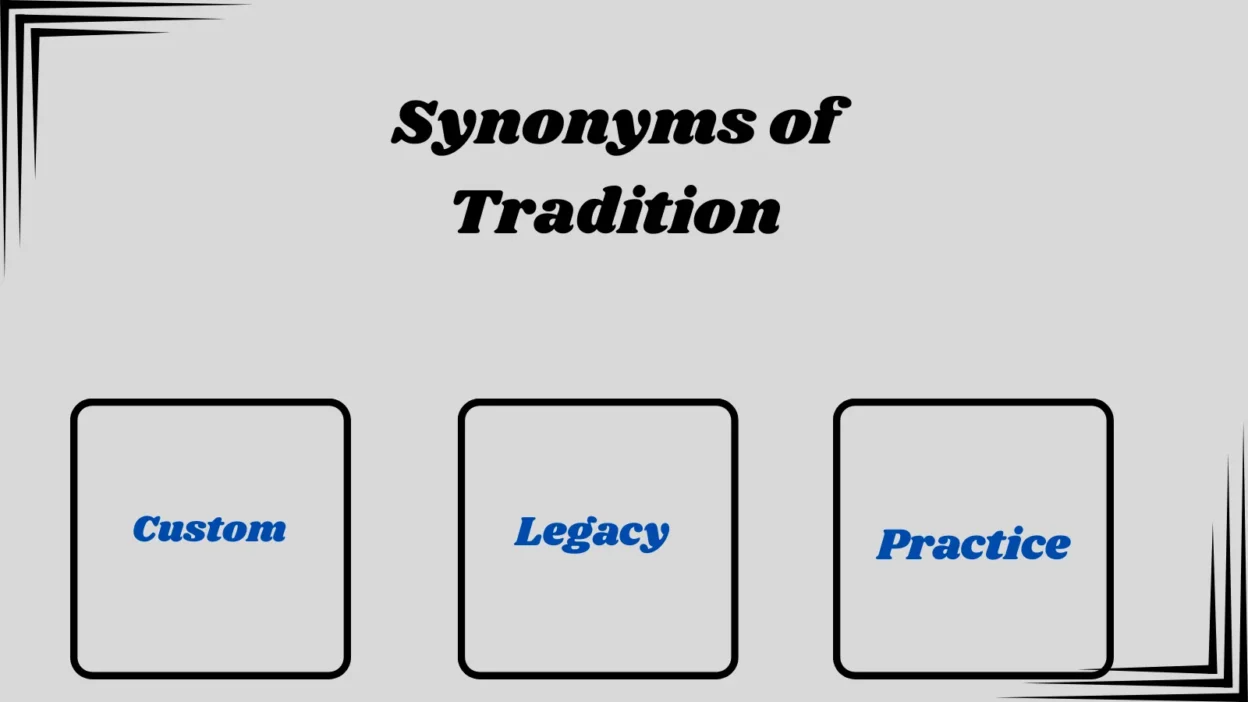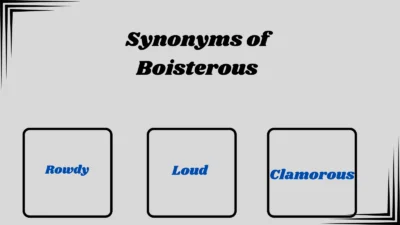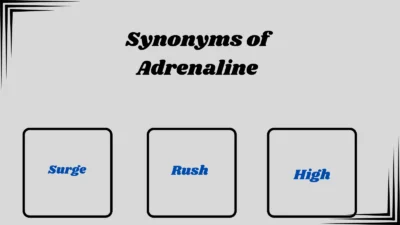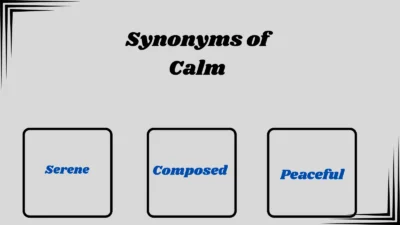Synonyms of Tradition can include words like custom, ritual, heritage, and convention, each offering a unique shade of meaning. If you’re talking about cultural practices, family routines, or historical legacies, these alternatives help you express the richness and continuity behind the idea of tradition.
For example, when describing a long-standing holiday practice, ritual might feel more personal, while heritage connects to broader cultural identity.
In this guide, we’ll explore the most fitting synonyms for different contexts so you can choose the perfect word every time.
Understanding these nuances not only improves your vocabulary but also deepens your appreciation of cultural expressions. Whether in writing or conversation, the right Synonyms of Tradition can bring tradition to life.
What Does Tradition Mean?
At its heart, tradition is a custom, belief, or practice passed down through generations, often shaping a group’s identity. It can be something as simple as a family recipe or as profound as religious rites. Tradition is often about connection, stability, and shared values, but it can also carry a tone of conservatism or nostalgia.
When selecting synonyms, it’s helpful to think about the tone — is it reverent, casual, formal, or even critical? This helps us find the perfect word to convey the exact shade of meaning you want.
30 Synonyms of Tradition (with Descriptions & Examples)
1. Custom
Definition: A habitual practice specific to a group or culture.
Best For: Everyday or cultural habits.
Example: It’s a local custom to exchange gifts at the harvest festival.
2. Heritage
Definition: Valued objects, qualities, or cultural legacies passed down.
Best For: Formal or cultural identity contexts.
Example: Their music is part of the country’s rich heritage.
3. Convention
Definition: A generally accepted practice or rule.
Best For: Formal, societal norms or expected behaviors.
Example: It’s a convention in many places to shake hands when greeting.
4. Ritual
Definition: A set sequence of actions with symbolic meaning.
Best For: Religious or ceremonial contexts.
Example: The ritual of lighting candles marks the start of the ceremony.
5. Practice
Definition: The actual carrying out of a custom or habit.
Best For: Everyday or habitual actions.
Example: Yoga is a daily practice for many people.
6. Legacy
Definition: Something handed down from the past, often intangible.
Best For: Emotional or historical significance.
Example: She feels proud of her family’s legacy of activism.
7. Folklore
Definition: Traditional stories, beliefs, or customs of a community.
Best For: Oral or mythic traditions.
Example: The village’s folklore is filled with tales of forest spirits.
8. Doctrine
Definition: A set of beliefs held and taught by a group.
Best For: Religious or ideological contexts.
Example: The doctrine of nonviolence guides their community’s actions.
9. Habit
Definition: A regular tendency or practice, often personal.
Best For: Informal or individual behavior.
Example: It’s her habit to greet every guest with a smile.
10. Lore
Definition: Traditional knowledge or stories about a subject.
Best For: Mystical or cultural knowledge.
Example: The fishermen share lore about the sea passed through generations.
11. Mode
Definition: A manner or method of doing something traditional.
Best For: Formal or technical descriptions.
Example: The mode of dress reflects the region’s traditions.
12. Usage
Definition: The customary way of doing something.
Best For: Linguistic or habitual contexts.
Example: In local usage, the word has a different meaning.
13. Ceremony
Definition: A formal event following traditional rites.
Best For: Celebrations, rituals, or official acts.
Example: The graduation ceremony honors academic tradition.
14. Customary Law
Definition: Traditional laws passed down in a community.
Best For: Legal or anthropological contexts.
Example: Customary law governs land rights in the village.
15. Mores
Definition: Strongly held societal norms or moral customs.
Best For: Ethical or cultural expectations.
Example: The community’s mores prohibit dishonesty.
16. Ancestry
Definition: The lineage or family traditions inherited from forebears.
Best For: Personal or familial contexts.
Example: Her culinary skills come from her rich ancestry.
17. Ceremonial Practice
Definition: Traditional actions performed during ceremonies.
Best For: Formal or spiritual contexts.
Example: The ceremonial practice of tea drinking is centuries old.
18. Cultural Identity
Definition: The shared customs and beliefs defining a group.
Best For: Sociological or anthropological discussions.
Example: Language is a core part of cultural identity and tradition.
19. Ethos
Definition: The characteristic spirit or values of a culture.
Best For: Abstract or philosophical contexts.
Example: The ethos of hospitality runs deep in their tradition.
20. Folklife
Definition: The traditional lifestyle and culture of a group.
Best For: Ethnographic or historical writing.
Example: The museum showcased the region’s folklife and customs.
21. Hereditary Practice
Definition: Traditions passed down through family lines.
Best For: Genealogical or familial discussions.
Example: Hereditary practice of craftsmanship is common in the town.
22. Rite
Definition: A religious or formal custom or ceremony.
Best For: Spiritual or cultural ceremonies.
Example: The rite of passage marks adulthood in many cultures.
23. Transmission
Definition: The act of passing traditions from one generation to another.
Best For: Educational or cultural continuity topics.
Example: The transmission of oral stories keeps tradition alive.
24. Convention
Definition: Widely accepted norms or customs.
Best For: Social or professional norms.
Example: In writing, following genre conventions is key.
25. Customary Practice
Definition: A habitual way of acting based on tradition.
Best For: Formal or legal contexts.
Example: Customary practice requires neighbors to help each other during harvest.
26. Time-honored Practice
Definition: Traditions respected for their long history.
Best For: Respectful or nostalgic tone.
Example: The time-honored practice of storytelling brings the community together.
27. Folk Custom
Definition: Traditional practices of common people.
Best For: Ethnographic or informal contexts.
Example: Folk customs include dances performed during festivals.
28. Patrimony
Definition: Heritage or property inherited from ancestors.
Best For: Formal, cultural, or legal contexts.
Example: The ancient monument is part of the nation’s patrimony.
29. Ancient Practice
Definition: Customs that have existed for a very long time.
Best For: Historical or reverent writing.
Example: Ancient practices like weaving connect us to our ancestors.
30. Established Practice
Definition: A well-recognized and longstanding custom.
Best For: Formal or institutional contexts.
Example: It’s an established practice to begin meetings with a moment of silence.
How to Pick the Right Synonym for Tradition
- Formal or legal? Use customary law, patrimony, or established practice.
- Cultural or heritage-focused? Opt for heritage, ancestry, or folklore.
- Religious or ceremonial? Choose rite, ritual, or ceremony.
- Casual or everyday use? Go with custom, habit, or practice.
- Philosophical or abstract? Try ethos or cultural identity.
Consider the emotional tone:
- For nostalgic or reverent moods, time-honored practice or legacy work beautifully.
- For critical or analytical tones, convention or mores might fit better.
- For storytelling or folklore-based writing, choose lore, folklife, or folk custom.
Conclusion:
Tradition is more than just repetition—it’s a reflection of culture, values, and identity. Using Synonyms of Tradition, like custom, ritual, heritage, or convention, allows you to express these concepts with clarity and nuance, depending on the context.
Each word brings its own tone—whether formal, personal, or historical—helping you communicate more effectively. By choosing the right synonym, you honor the depth behind traditional practices while keeping your language engaging and precise.
Expanding your vocabulary gives you the tools to describe long-standing practices with accuracy and respect. Keep exploring language to better capture the meaning behind the customs that shape our lives.




